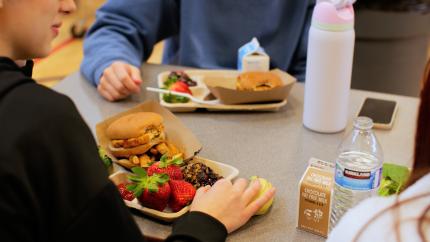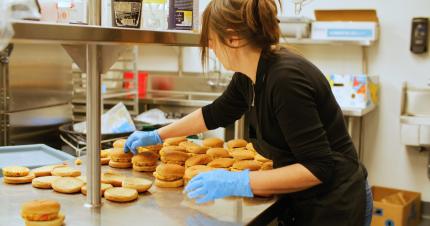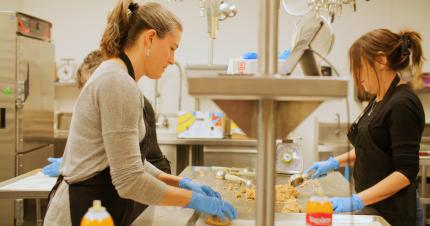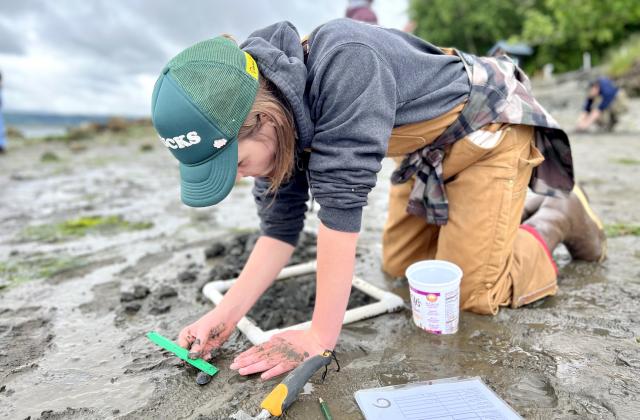Media Contact
Katy Payne she/her
360-764-0201
As Erica Lamson watched dozens of middle schoolers taste a new recipe for salmon chowder, she fully expected some of the kids to turn it down just because of the fish.
The opposite happened.

Nearly every single student liked the recipe, which the La Conner School District had developed with support from a U.S. Department of Agriculture (USDA) Team Nutrition Grant. These grants have a different focus area every year; the salmon chowder recipe was developed under the fiscal year 2021 Team Nutrition Grant, when the focus was on recipes and scratch cooking.
“It was amazing to be out there and to talk to the kids,” said Lamson, Grants and Summer Food Service Program Specialist for the Office of Superintendent of Public Instruction. “They loved the soup.”
OSPI has applied for and earned Team Nutrition Grants in fiscal years 2021, 2022, and 2023. Lamson worked closely with Kelly Kjarstad, Food Service Director for the La Conner School District, in developing the salmon chowder recipe.
Kjarstad grew up in the district, comprised of rural communities about 35 miles southwest of Bellingham. Though the district includes the Swinomish Reservation and approximately 40% of its students are tribal members, Kjarstad said their school meals hadn’t included many Native foods.
“I saw the opportunity to try to come up with something,” Kjarstad said. “That is the reason why I did it in the beginning. I was trying to make our menus a little bit more inclusive.”
Developing new recipes can be a challenge. Along with meeting the USDA’s nutrition requirements, Kjarstad needed to use local foods in the district’s recipes. Students need to like the meal, too.
During the salmon chowder taste test, only one student gave it a thumbs down. He asked Kjarstad if the school would create a recipe that a student suggested, and she was thrilled to do it.
After Kjarstad made the recipe—derived from the student’s family recipe for stuffing—she had him sample it, only moving forward to serving it at lunch if he felt proud of it. And he loved it.

“It opened the doors … for [students] seeing us as other than just people serving them food,” Kjarstad said. “Knowing that we’re working, we’re trying, and it is important to us to get them things they like. We do the best that we can.”
The emphasis on scratch cooking has carried into the Team Nutrition Grants for both the 2022 and 2023 fiscal years.
“They’re distinct projects,” Lamson said, “but how do we make them leverage each other so that the whole is larger than the sum of the parts?”
The focus of the grants for the 2022 fiscal year is on trainings for school nutrition professionals. When Abby Miller learned this, she knew it was “perfect” for her mentorship program.
Miller is the Team Nutrition Grant Coordinator at Educational Service District (ESD) 101, which supports the schools in northeast Washington. She had developed the mentorship program a few years prior with the goal of supporting the school nutrition professionals serving the small, rural school districts that comprise the ESD.
With most of these school districts serving about 100 students, Miller said many were “overwhelmed” by the regulations and duties required of food service programs. Their food service directors also serve in roles as bus drivers or superintendents, and many simply didn’t have the time to attend the webinars and conferences that would bolster their school nutrition programs.
“To have someone come in and be able to train them in that mentorship setting has been super effective,” Miller said.
Miller’s mentorship program offers structured trainings, including a back-to-school training that focuses on scratch cooking, as well as in-the-moment trainings that address a district’s unique needs and regular opportunities for networking and collaboration. The program started out by serving 19 of ESD 101’s 59 school districts, but interest in it quickly spread beyond the ESD.
The Team Nutrition Grant made it possible to expand the mentorship program to four additional ESDs that also serve mostly small, rural school districts. A total of 60 school districts across ESDs 105, 113, 123, and 171––serving central Washington, southeast Washington, and the southwest Puget Sound region––now participate.
“Our primary objective is to help build people,” Miller said. “Hand in hand with that is quality improvement of these programs. … Seeing these transformations has been really exciting. We’re looking at people who have been doing 100% heat-and-serve … transition to local foods, transition to scratch cooking, and really exciting menu options.”

The focus area for the Team Nutrition Grant in fiscal year 2023 is on nutrition education, including increasing consumption of healthy foods in school nutrition programs and reinvigorating school wellness policies. Since the grant funding became available in September, Lamson has set a goal of enrolling approximately 160 nutrition program sponsors in one or more year-long training programs.
Supporting school nutrition professionals ultimately means that students have increased access to nutritious, high-quality school meals, Lamson said.
“Kids can only learn if they’re not hungry,” Lamson said. “The foods that they’re eating at school contribute a huge amount to what they’re eating throughout the day. Having those be very healthy foods does a couple of different things. One, it gets healthy food into their bodies and minds so that they can learn and develop and [do] all the things that we want kids to do. But then it also teaches them how to eat healthy foods, which will stay with them throughout their life.”
She added, “That’s the point: to create healthy eaters, and healthy relationships with food, [and] an understanding about what food is and how it’s connected to the community.”









